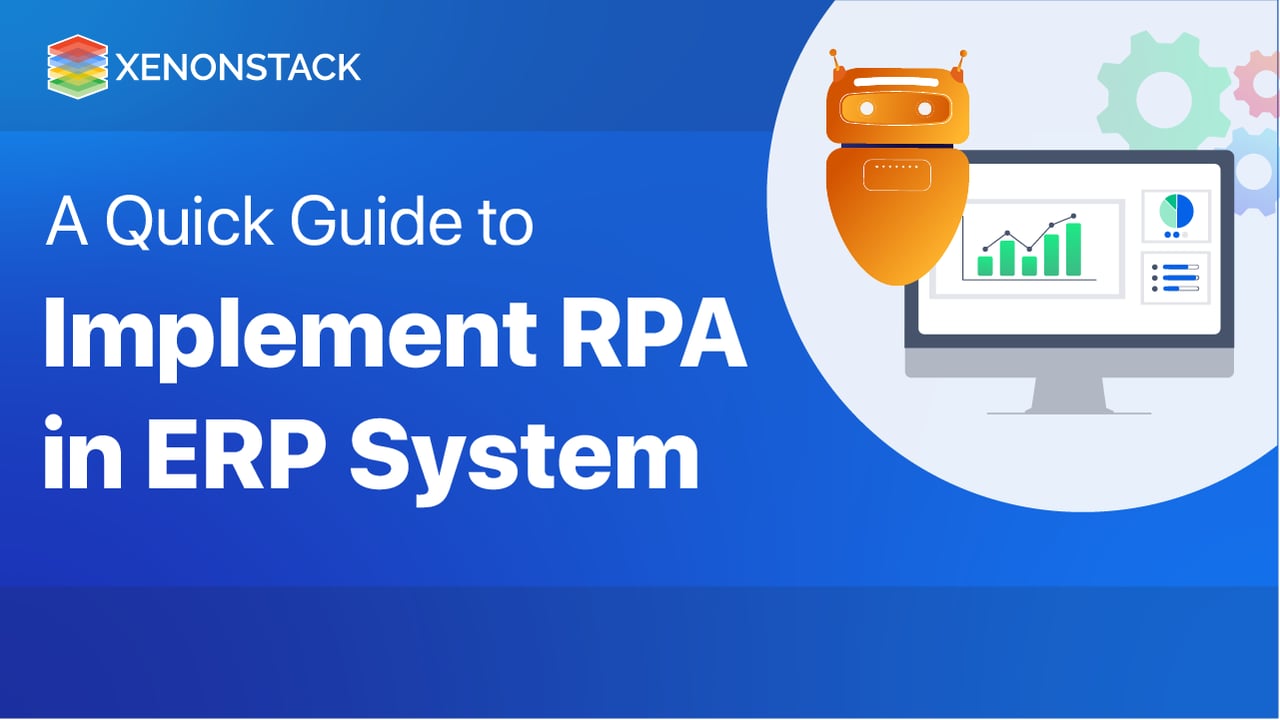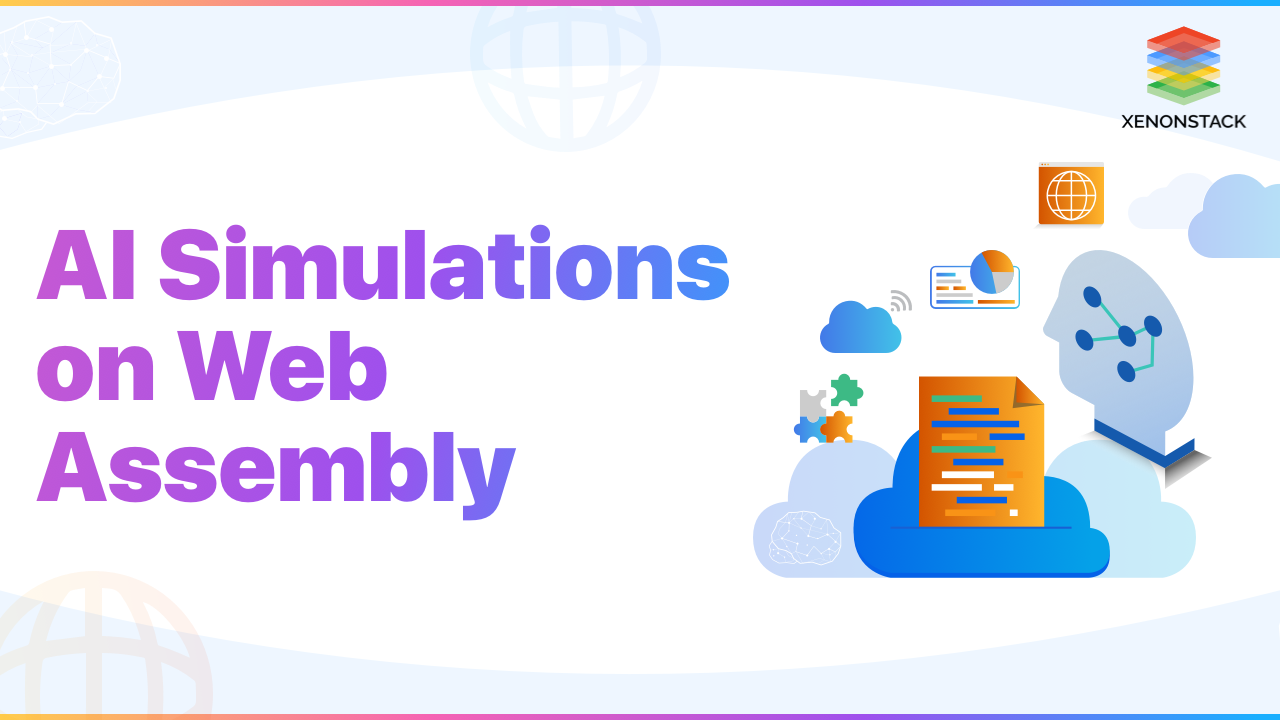
What Is RPA and Its Role in ERP?
An Enterprise Resource Planning (ERP) system unites business processes and automates them, such as extracting users' data, applying operations on that data, scheduling the operations, and keeping records of the data or user actions. In contrast, Robotic Process Automation (RPA) is one of the most widely explored areas by the industry due to its ability to transform traditional business processes. This software bot replaces human efforts to perform repetitive tasks. Here’s how we can use RPA in ERP systems.
RPA does not require the development of code, nor it needs direct access to the code or database of the applications. Click to explore about, Robotic Process Automation Architecture and Tools
Key Differences Between RPA and ERP Systems
|
Aspect |
ERP (Enterprise Resource Planning) |
RPA (Robotic Process Automation) |
|
Objective |
Streamline and integrate business processes across an organization |
Automate repetitive, rule-based tasks using robots or bots |
|
Process Flow |
Entire process completed in a single flow |
Different operations require different types and numbers of robots |
|
Technology |
Typically integrates software systems to manage business processes |
Uses robots or automation tools to perform specific tasks |
|
Complexity |
Complex, often requires comprehensive implementation across departments |
Simple automation of repetitive tasks, no need for full-system integration |
|
Flexibility |
Less flexible, requires substantial configuration and customization |
More flexible, can automate tasks without requiring significant changes |
|
Use Case |
Used for overall business management, such as finance, HR, and supply chain |
Primarily used for automating specific tasks like data entry or customer service |
|
Integration |
ERP systems integrate various business functions into one unified system |
RPA automates specific processes and can be used with existing systems |
Why Is RPA Essential in ERP Systems?
Robotic Process Automation (RPA) robots work the way a person completes a task without the need for modifications in the process. RPA can bridge the gap between Cloud ERP and legacy applications, preserving the value of legacy operations while adding the capabilities of the cloud.
-
Bridging Legacy Systems and Cloud ERP: RPA preserves the value of legacy operations while enhancing Cloud ERP capabilities.
-
Overcoming ERP Selection Challenges: RPA helps businesses efficiently navigate Cloud ERP selection obstacles, enabling them to leverage the latest technology.
-
Cost and Labor Efficiency: RPA in ERP Systems reduces costs and labor by automating time-consuming tasks, improving developers' workflows, and freeing up time for other essential responsibilities.
-
Enhancing Legacy Software and ERP Integration: RPA acts as the middleman between legacy software and ERP applications, allowing companies to retain the benefits of traditional software while leveraging the enhanced performance of RPA-implemented ERP.
Steps to implement RPA in Enterprise Resource Planning Systems
While automating the business process using RPA with the ERP systems, we need to keep several things in mind:
What to Automate?
First, identify which operations to automate. Start by automating tasks such as sending emails, creating consumer reports, and running processes for specific data or users. This can help reduce time consumption. The RPA bots can understand the logic behind these tasks and automatically execute them without interruption.
Mapping and Optimization of Processes
Building a process plan is essential to ensure clarity in each action needed to complete the process. This is a good opportunity to optimize and improve the process, removing inefficiencies and ensuring all necessary steps are added. This contributes to process optimization within ERP systems.
With RPA, we get a virtual employee who can perform repetitive activity faster and more cost-effectively than humans. Click to explore about, Best Open Source RPA Tools
What Are the Most Effective RPA Solutions?
The Robotic Process Automation (RPA) solutions for challenges in various business functions are outlined below:
RPA in the Supply Chain
In the supply chain, RPA can automate the predictions of results, handle complicated decisions, and help employees by executing robotic tasks. Implementing the RPA industry can automate several business processes in the supply chain:
-
Vendor Selection & Procurement: While implementing ERP in the supply chain, the vendor selection process requires human interaction to finalize the vendor. However, RPA and ERP can automate vendor selection and procurement by selecting vendors, analyzing documents, running credit checks, and finalizing vendor selection. RPA can significantly improve cycle time and processing time by automating these tasks, leading to more efficient procurement processes.
-
Status Communication: The status communication process requires human interaction. Employees need to check the status of the process from shipment records or emails and then manually update the ERP system. In contrast, RPA can process the shipment record and automatically provide the status to the customers, thus reducing manual effort and improving communication efficiency.
RPA in HR Management
There is a need to implement RPA in HR Management to reduce the business function's time consumption to complete. So, the necessary automatic modules are:
-
Employee Management: In traditional ERP systems, employee management was a manual task that needed human intervention to select an employee based on skills, knowledge, and experience. With RPA, software robots can now perform this process without human interaction, automating the selection process, evaluating documents, and filling in data on their own. This reduces time consumption and minimizes human dependency in the process.
-
Payroll: Payroll processing requires tracking the total number of worked days and then calculating the total amount to be paid. In traditional ERP systems, this requires manual input of workdays and calculations. However, RPA can verify employee data consistency across various systems and platforms, ensuring the accuracy of the data. RPA can automate the entire payroll process, from paycheck production to performance and compensation management, preventing errors and delays and improving efficiency.
Key Benefits of RPA in ERP Systems
The key benefits of RPA in ERP systems are given below:
Non-disruptive Integration with Legacy Systems: RPA reflects human actions and interacts with various data types across applications and platforms. It enables enterprises to implement automation without requiring modifications to pre-existing legacy systems, making it a non-disruptive solution for businesses.
Centralized Management and Monitoring: Enterprises with the ability to remotely schedule and monitor RPA software robots' deployment benefit significantly from a centralized management platform. This allows for real-time analytics and auditing to occur simultaneously, improving efficiency and control.
Enhanced Governance and Automation Rules: RPA enables enhanced governance by setting specific conditions within automation rules, ensuring that tasks are executed in compliance with established standards and guidelines.
Improved Back-office Operations: Achieving the benefits of automating back-office tasks can be challenging, but RPA allows businesses to provide consistent, high-quality assistance to consumers in a repetitive manner, improving productivity and reducing human error.
Faster Reporting and Onboarding: RPA helps streamline processes such as subjective reporting, onboarding, and other routine activities, making them faster and more efficient while reducing manual effort.
How RPA Is Transforming ERP System Efficiency
RPA produces several benefits, such as reduced expenses in development, testing, and maintenance, faster delivery of solutions, and more. In the context of ERP systems, RPA is transforming various business functions, particularly in financial services. Here’s how RPA works in these areas:
Economic Planning
RPA can automate the process of merging and processing financial reports from multiple functions within an Economic Planning & Analysis system, significantly speeding up the process and enhancing efficiency.
Bank Statement Reconciliation
Extracting data from bank statements to reconcile records and compare them against the company’s records was previously a labor-intensive task involving complex spreadsheets. However, RPA automates this process. A critical point to note is that rules-based automation may break when a company changes its banking partners. Therefore, it’s essential to test the bots’ primary outcomes when changing banking service providers.
Daily P&L Preparation
Financial service companies, especially those in the trading business, track P&L and risk exposures daily. Some companies have automated these processes using RPA, eliminating the reliance on Excel and other manual tools. Despite this, some companies still depend on manual effort to complete these reports, highlighting the ongoing transformation through RPA in ERP systems.
RPA in Supply Chain allows supply chain businesses to scale up swiftly to meet supply chain business requirements as demand increases. Click to explore about, RPA in Supply Chain Industry
Challenges Faced During RPA Implementation in ERP
The automation of business processes brings numerous benefits, attracting organizations to adopt RPA for various tasks. However, there are several challenges that an organization may face during the RPA implementation process:
-
Restricted Application: If the data is in a handwritten document, it’s simple for ERP systems because a team member can manually enter the data. However, RPA struggles to extract data from handwritten documents, making it difficult to automate tasks that rely on such data formats.
-
Unfit Unification and Dependent functions: In ERP, the entire process can be executed in a single flow, but in RPA, different processes may require separate robots, each with different types and capabilities. If the job executed by one robot triggers a task that needs to be handled by another, the coordination between these robots can become complex. In large organizations, this could lead to the need for more resources and longer execution times, making the implementation more challenging.
-
Improvement in Process after Automation: Any improvements or changes to a business process should be made before implementing RPA. Making changes after automation is in place can lead to inefficiencies, as the automation will require substantial maintenance, adding to the overall cost and complexity. This can undermine the benefits of RPA and hinder its long-term success.
Key Insights on RPA in ERP Systems
In this blog, we discussed the need for RPA in ERP Systems, why businesses should follow RPA steps to automate business processes in ERP, and the challenges that occur during the implementation of RPA in ERP. It’s essential to handle these challenges properly to ensure the successful implementation of the RPA tool for better productivity. RPA is a powerful solution for reducing the cost and time consumption of a process. Organizations are increasingly adopting this technology as it helps them stay competitive and perform better in the industry.
Essential Steps for RPA ERP Implementation Success
Connect with our experts to explore the implementation of RPA systems. Learn how industries and various departments leverage Agentic Workflows and Decision Intelligence to become more decision-centric. RPA uses automation to streamline and optimize IT support and operations, enhancing efficiency and responsiveness.


